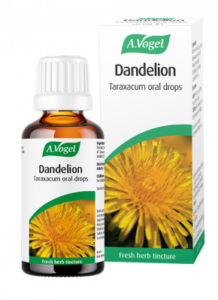





Dandelion 50ml Drops A Vogel
£11.99 Original price was: £11.99.£9.59Current price is: £9.59.
What is dandelion?
A Vogel Dandelion, Dandelion is a plant with yellow flowers.Taraxacum officinale is the most common variety of this plant, and it grows in many parts of the world. Botanists consider dandelions to be herbs. People use the leaves, stem, flower, and root of the dandelion for medicinal purposes.
Dandelion Benefits
Antioxidant
Antioxidants work to neutralize the harmful effects of free radicals. The human body produces free radicals naturally, but they cause harm by accelerating aging or the progression of certain diseases.
Dandelions contain beta-carotene, which is an antioxidant that helps protect cells from damage. ResearchTrusted Source shows that carotenoids such as beta-carotene play a vital role in reducing cell damage.
The flower of theTaraxacum officinale is also full of polyphenols, which are another type of antioxidant.
2. Reducing cholesterol
Dandelions contain bioactive compounds that may help lower a person’s cholesterol.
One study from 2010Trusted Source examined the effects of dandelion consumption in rabbits. Its results found that dandelion root and leaf could help lower cholesterol in animals on a high-cholesterol diet.
Another studyTrusted Source in mice found that Taraxacum officinale consumption reduced total cholesterol and levels of fat in the liver. The researchers concluded that dandelion might one day help treat obesity-related nonalcoholic fatty liver disease.
However, testing on humans is necessary to help determine how effective dandelion could be for lowering cholesterol.
3. Regulating blood sugar
There is some evidence to suggest that dandelions contain compounds that may help with regulating blood sugar.
In 2016, some researchers proposedTrusted Source that dandelion’s antihyperglycemic, antioxidative, and anti-inflammatory properties may help treat type 2 diabetes. However, further research is required to make any definitive claims.
4. Reducing inflammation
Some studies indicate that Taraxacum officinale extracts and compounds may help reduce inflammation in the body.
In one 2014 studyTrusted Source, researchers found that chemicals present in dandelions had some positive effects on reducing inflammatory responses.
They conducted the study in cells and not in human participants, which means that more studies are necessary to conclude that dandelion reduces inflammation in the human body.
5. Lowering blood pressure
There is little research to support the use of dandelion for lowering blood pressure.
However, Taraxacum officinale are a good source of potassium. There is clinical evidence that shows that potassium can help reduce blood pressure.
For example, researchTrusted Source has found that people taking a potassium supplement saw a reduction in their blood pressure, especially if they already had high blood pressure.
6. Aiding weight loss
Some researchers have proposed that Taraxacum officinale could help people achieve their weight loss goals. This is based on the plant’s ability to improve carbohydrate metabolism and reduce fat absorption.
A small study of miceTrusted Source found that chlorogenic acid, a chemical present in dandelions, may help reduce weight gain and lipid retention. Strong evidence to support this claim is lacking, however.
Boosting the immune system
There is growing evidence that suggests thatTaraxacum officinale can help boost the immune system.
Researchers have found that Taraxacum officinale show both antiviral and antibacterial properties. For example, one 2014 studyTrusted Source found that dandelions help limit the growth of hepatitis B in both human and animal cells in test tubes.
More research is now required to determine the impact of Taraxacum officinale on the immune system, however.

















Reviews
There are no reviews yet.